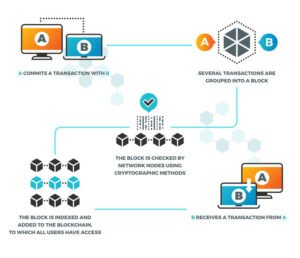Human beings have been interested in the “value” of precious metals for a long time. Even thousands of years ago, we were trading precious metals while also using the same metals (such as gold) as both money for exchange and a store of value. In a world where investors are often trying to find assets that aren’t so closely associated with stocks or bonds, it’s easy to see how gold’s market capitalization has climbed to somewhere around $15 trillion. Of course, this doesn’t even include other precious metals such as silver, palladium, and platinum.
Many cryptocurrency analysts often compare Bitcoin to gold, suggesting that both are inflation hedging options. Recently, more high-profile analysts are suggesting that Bitcoin may still prove to be a good option. The well-known billionaire venture capitalist Chamath Palihapitiya, the CEO of Social Capital, once stated that Bitcoin has “effectively replaced gold.”
Let’s put Bitcoin aside for a second. What if blockchain technology can also help improve the precious metals industry through tokenization? What exactly does that look like, and what solutions are currently being developed and implemented?
Why precious metals matter
The reasons why so many individuals and institutions have invested in precious metals over the years are often similar to the reasons that people invest in Bitcoin, Ethereum, and other cryptocurrencies. Many of them consider both crypto and precious metals a “safe haven” in comparison to other investments. Many millennial investors are interested in crypto, for example, because they have been jaded thanks to the Great Recession, which affected the wealth of millions of Americans.
 Others might think of precious metals as a way to diversify their investment portfolio, while others consider commodities because of the tax benefits. Some long-term precious metal investors appreciate that it’s a tangible asset, rather than paper money that can potentially be subjected to regulation and manipulation. China, for example, is known to manipulate its own currency for economic and geopolitical reasons.
Others might think of precious metals as a way to diversify their investment portfolio, while others consider commodities because of the tax benefits. Some long-term precious metal investors appreciate that it’s a tangible asset, rather than paper money that can potentially be subjected to regulation and manipulation. China, for example, is known to manipulate its own currency for economic and geopolitical reasons.
Modern challenges of supply chain traceability
Before you get too excited about buying a boatload of gold or silver, it’s important to note that there are issues with the mining industry. Common problems include the fact that the sector is susceptible to fraud, with mining companies altering their records regarding where their minerals were sourced. There’s also other major challenges, including human rights concerns, surrounding the mining industry.
Large corporations are more concerned than ever with supply chain traceability. Apple has expressed interest in integrating blockchain technology to reduce any potential human rights concerns, for example. Whether it involves ethical sourcing, human rights, or environmental concerns, it’s easy to see how blockchain can address these issues.
Blockchain can enhance supply chain traceability so that it can be verified that raw materials adhere to specific standards. A mining company, for example, might be able to conceal where exactly their minerals were sourced. Now, raw materials can be traced on the blockchain rather than allowing mining companies to alter their records for their own purposes. In this way, blockchain can also help to reduce fraud significantly in the sector.
Blockchain can disrupt the mining industry
While the world of cryptocurrency trading is often discussed in terms of how it can disrupt finance, the truth is that blockchain can disrupt many different industries throughout the world. For investors interested in investing in precious metals, blockchain can offer the ability to invest in metal-based tokens. The digital assets offer a level of speed and mobility that was not previously possible.
Tokenization allows for faster settlements and transactions. However, smart contracts can also make it much easier for mining companies to work successfully with partners and stakeholders. The fact that the technology is both secure and transparent can prove useful in various ways: invoicing, real-time reserve calculations, and compliance.
Here’s how smart contracts work in the blockchain:

There are already startups and organizations dedicated to using blockchain for this purpose. Aurus DeFi, for example, is a company that seeks to offer tokenization solutions for gold. Paxos Global has issued a gold-backed token as well, and many other commodity-backed tokens are emerging.
What’s next for precious metal mining?
Many investors love the fact that precious metals have a finite supply, and that they can act as a great inflation hedge or safe haven. There’s no question that blockchain can help make it easier for traders to exchange assets efficiently and quickly through smart contracts. Stablecoins have become a staple of the cryptocurrency markets, so it seems clear that the future will bring the emergence of more tokenized metals.
There is a global demand for precious metals, and blockchain can help ensure that the markets are more liquid and accessible. In addition, blockchain can also help disrupt the entire mining industry in general, thanks to the fact that it offers transparency, traceability, and accountability.
About the Author

Michael Hearne
About Decentral Publishing
Decentral Publishing is dedicated to producing content through our blog, eBooks, and docu-series to help our readers deepen their knowledge of cryptocurrency and related topics. Do you have a fresh perspective or any other topics worth discussing? Keep the conversation going with us online at: Facebook, Twitter, Instagram, and LinkedIn.


